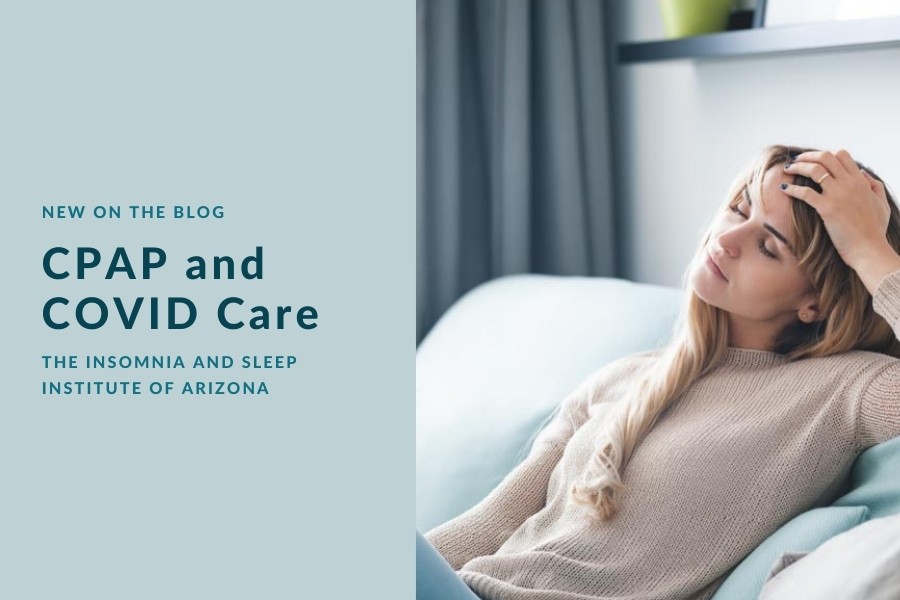At The Insomnia and Sleep Institute of Arizona, we are proud to serve you as the Face of Sleep Medicine in the Phoenix area. CPAP therapy has long been the gold standard for managing obstructive sleep apnea (OSA), but in the past year it has also been used to care for type-1 respiratory failure related to COVID-19. A retrospective, observational study considers whether or not CPAP is the best approach for the latter condition. The Insomnia and Sleep Institute is committed to providing patients with the latest information on sleep disorder and therapies, and that includes how these approaches can overlap with other types of care.
The study, published in BMJ, aimed to consider how effective CPAP therapy is in those with COVID-19 and struggling with respiratory failure. In the last year, CPAP has been delivered to a number of patients in negative-pressure rooms at infectious disease units around the world. This study looked at 24 patients at the Royal Liverpool Hospital being treated for type-1 respiratory failure in April 2020. The authors share that the overall results with CPAP were positive. They managed to administer CPAP “outside the walls of a critical care or high-dependency unit environment.” This resulted in 58 percent of patients being able to “avoid mechanical ventilation” and an incredible 79 percent survived and were later discharged. This, of course, was during the initial peak of COVID-19 when mortality rates were relatively high, making a survival rate of 19 out of 24 rather impressive.
How Sleep Clinics Use CPAP in Phoenix
As you can see, CPAP therapy can be effective, useful, and life-saving beyond the treatment of obstructive sleep apnea. However, at The Insomnia and Sleep Institute, we exclusively prescribe CPAP therapy for the many people struggling with OSA in the Phoenix area. We are proud to have been voted “Top Doc” in the region for the last six conservative years and are staffed by sleep specialists concentrating in sleep medicine.
You can enjoy unprecedented staffing levels and work with three sleep specialists, a physician assistant with a Masters in Sleep Medicine, respiratory therapists, and many other experts at this local sleep center. We are driven by outcomes, which is why consultations are only with sleep specialists who can diagnose sleep disorders. A correct diagnosis is the first step towards effective testing and treatment. Currently, for your convenience and safety, we continue to offer virtual consultations.
CPAP and OSA in Phoenix
OSA is the most common form of sleep apnea. It is estimated that about 30 percent of adults aged 30 – 70 have OSA and snoring is one of the most common signs (though not everyone who snores has OSA, which is why the right diagnosis is critical). Having OSA means that your breathing while you sleep is blocked intermittently many times throughout the night. CPAP therapy forces the airway to remain open and allows for proper breathing throughout the night.
While snoring is one of the most common signs of OSA, not everyone has a bedmate or a significant other who notices snoring. Other signs that you might have OSA include extreme fatigue throughout the day even when you feel like you got enough sleep or if you catch yourself waking up at night in need of breath. If you suspect that you might have OSA or any other type of sleep disorder, it’s critical to work with sleep specialists like The Insomnia and Sleep Institute. Lack of sleep can make you just as drowsy as if you had consumed alcohol, which can put you in danger throughout the day and negatively affect relationships, enjoying life, and even put your job at risk.
Alternatives to CPAP in Phoenix
CPAP requires a machine, tubes, and a specialized face mask. CPAP works very well for most people with OSA. However, in the rare cases that CPAP is not for you, you might be a candidate for the Inspire Implant. Dr. Ruchir P. Patel is the resident expert on Inspire implants. All patients are required to try CPAP in Phoenix before considering the Inspire implant.
To learn more about treatment options for OSA, CPAP therapy, or any other sleep concern, contact The Insomnia and Sleep Institute today. You can complete the online form now or call the office to schedule a consultation.
Dr. Ruchir P. Patel Shares His Own Personal CPAP Journey
In this short teaser from the Dr. Ruchir P. Patel: The Real Sleep Doc podcast, Dr. Patel opens up about his own experience with CPAP therapy. Listen to the rest of the episode here.
Stay tuned for more insights in upcoming episodes!





